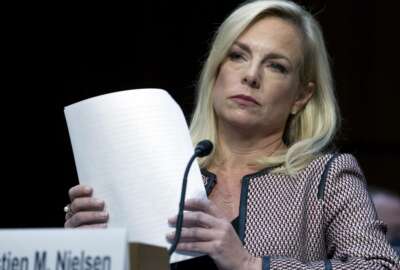To listen to the Federal Newscast on your phone or mobile device, subscribe on PodcastOne or iTunes.
- Democrats push back against President Trump’s idea for a military parade. Rep. Marc Veasey (D-Texas) introduced the Preventing the Allocation of Resources for Absurd Defense Expenditures, or PARADE act, which prohibits using taxpayer funds to pay for the parade. Sen. Ben Cardin (D-Md.) introduced similar legislation in his chamber.
- President Donald Trump’s fiscal 2019 budget request heads to Congress today and will include $3 billion more in discretionary funding for the Veterans Affairs Department. The White House also wants funding to pay for almost 3,000 more border patrol agents and $3 billion more for the Health and Human Services Department to fight the opioid epidemic. The Office of Management and Budget said the request makes hard choices. (Federal News Radio)
- The president is expected to include proposals to change the current federal pay system in his 2019 budget request. The White House wants to change the decades-old General Schedule system that bases pay on tenure, to performance-based raises. It will also look at similar changes to the current federal employee retirement system. The president included similar retirement proposals in last year’s budget request. Congress would have to make changes to both retirement and pay through legislation. (Federal News Radio)
- A weird political appointment comes to a troubled end. Heath Hall, acting chief of the Federal Railroad Administration, abruptly stepped down. Politico reported, Hall, appointed last June, appeared to have kept up work, and billings, with his public relations firm in Mississippi. Hall had promised on ethics disclosures that the firm would go dormant once he joined the government. Hall had been on an extended leave for a family emergency when his departure became permanent over the weekend. (Politico)
- The Air Force wants to make sure it’s employees aren’t sending sensitive information through unencrypted emails.Putting personally identifiable information like Social Security numbers in plaintext emails is already against DoD policy, but from now on, the Air Force’s email system will automatically block its employees from sending those messages. Users will get messages telling them they need to either try again using encrypted email, or find another way to transmit the information — such as the widely used AMRDEC file sharing service operated by the Army’s Aviation and Missile Research, Development, and Engineering Center. (Air Force)
- It’s now harder for hackers to hijack taxpayer’s identities. The Treasury Inspector General for Tax Administration, or TIGTA, reported that the IRS has implemented a more rigorous electronic authentication process, which includes two-factor authentication. TIGTA said the IRS completed or updated risk assessments for 28 of its online applications. However, the IG concluded that the IRS didn’t fully implement network monitor tools it purchased to prevent and detect automated attacks. (Department of Treasury)
- The U.S. Postal Service reported a $540 million net loss. USPS’ quarterly revenue was nearly unchanged from last year, and saw an 11 percent increase in its operating expenses. Citing a decline in mail volume, Postmaster Megan Brennan said the the size of USPS’ workforce has been reduced by more than 152,000 workers. It also lessened the amount of federal real estate it operates. (Federal News Radio)
- The U.S. is underestimating how much it will cost to update its nuclear arsenal, according to a report from the Government Accountability Office. The report found discrepancies in the billions of dollars between the National Nuclear Security Administration’s projected funding and the expected modernization costs. (Government Accountability Office)
- The Agriculture Department kicked off its IT modernization effort with a new online portal. The agency launched Farmers.gov as part of its customer experience improvement strategy. Gary Washington, USDA CIO, said the agency wants to modernize its business systems to be more like a self-service activity. He said the end goal is for customers to engage USDA from a technology and a business perspective in a fluid, seamless and quick way. To get there, USDA is moving more applications and its infrastructure to the cloud to ensure its employees and customers are able to apply for loans, get technical assistance and financial assistance right on the farm.
- A former special agent with U.S. Immigration and Customs Enforcement-Homeland Security Investigations gets three years in prison for accepting bribes to have a case dismissed. The Justice Department said Christoper Ciccione admitted to accepting cash and gifts to get a drug trafficking indictment against a Colombian national dismissed. (Department of Justice)
Copyright
© 2025 Federal News Network. All rights reserved. This website is not intended for users located within the European Economic Area.




